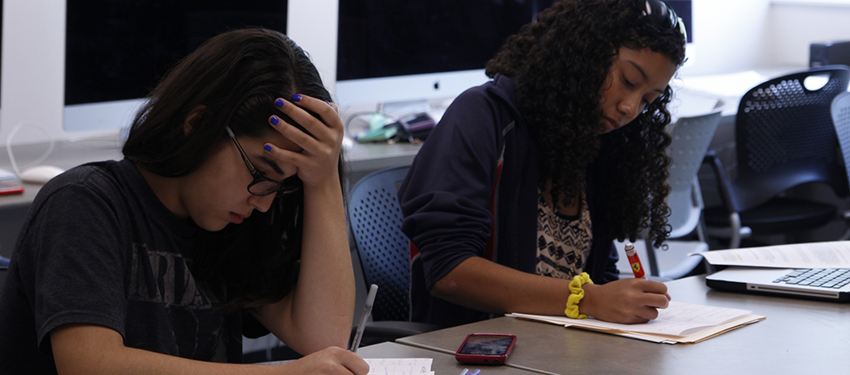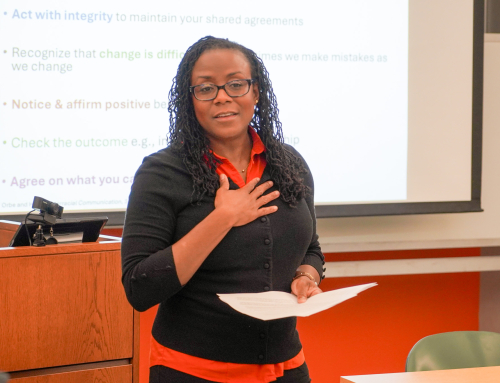Summer is a time when students are free from school and parents scramble to find a camp their child can have fun in, but that is also educational. With so many camp choices, probably the hardest sell for a parent to make to their free-from-the-constraints-of-learning child would be… debate camp. I can hear the conversation now:
“You mean a camp that’s like school,” asks a dumbfounded child.
“Kind of, but I swear it’s fun,” says a parent with a trembling voice.
This is the part when tears and arguments start and it’s also our cue to segue. A few weeks ago, I spent a day with middle and high school students who willingly spend three weeks of their summer at the Hurricane Debate Institute (HDI) at the University of Miami School of Communication. Many are repeat students, having spent past summers learning the art of debate, while making friends and having fun.
“We have a lot of returners. A lot of people come back. And we’re training them on reason and discourse so they can give speeches in their classes, so they can answer questions when their teacher calls on them, so that they do have more confidence in presenting ideas and their thoughts and expressing what they care about in front of groups. We make it fun. They play games and they get to know each other really well. It’s a terrific learning experience that makes the learning part kind of painless,” says David Steinberg, founder of HDI.
Students can choose to spend one, two, or three weeks at HDI under the guidance of instructors Patrick Waldinger, Leandra Lopez, Randall Martinez, and Michael Fuentes. The camp splits middle and high school students into groups, who then spend time learning Robert’s Rules of Order, argumentation, policy and parliamentary style debate, nonverbal communication, and public speaking. Time is also spent playing games that get them comfortable speaking in front of others.
“We try to make it interactive and fun. Even the games that we do like Taboo, or some of these other games, are all speaking activities. So it’s fun ways to get up and speak,” says Waldinger.
Allana Persaud, a senior in high school this upcoming fall, confided she didn’t want to come her first year, but liked it so much she’s been a camp attendee for three years.
“The first year I came here was because I was forced to by my parents, but I actually liked it, so then I joined the debate team at my school. I came here again to get better. And then I came here this year because senior year is coming up and I want to do a lot better and, like, make a bigger impact in my debate team, so that’s why I came. To work more on my speaking skills,” says Persaud.
Working on speaking skills is an important aspect of HDI, but students are also taught how to research, cite sources, interact with others, effectively use PowerPoint, and other life skills that may be touched upon during the academic year, but are honed during the camp.
“I think debate’s important to encourage in the classroom. There’s not a whole lot of room for it in the regular curriculum, so having an opportunity like this to not only develop their skills for competition, but to broaden them to a wide range of ideas is really important for educating the full person and giving the full perspective on things,” says Martinez.
Avery Tallman, a 13-year-old middle school student, is a second-year HDI student. Not only has he made friends at the camp, he has also learned skills that have facilitated his schoolwork.
“It sort of helps me through science because we do a little bit of interactive work in science and we do problem-based learning at my school, so knowing debate really helps with knowing how to do research,” says Tallman.
Teaching students from a young age how to research and find respected sources makes it easier for them to excel during the school year and is also preparation for college, where many classes culminate in a lengthy research paper.
“In schools the requirements and the standards for students in terms of writing and researching, and that kind of thing, are super high, but there isn’t a lot of time that’s taken to necessarily teach those specific skills. So let’s say a student is going to write a research paper, there’s an expectation to do citations, but the students haven’t necessarily been taught how to do them or what are the best places to do research. Some of what we do is teaching the student that, even if a source is a good source, the person’s qualified and it seems like a legitimate website, biases are still existing and so you want to find multiple sources of multiple pieces of evidence so you are not citing someone and, even if they have a Ph.D, it turns out they are not the best source for the position they are taking,” says Lopez.
Persaud noticed the positive effect the camp had on her research skills while taking high school English.
“It’s helped me a lot in English because I have to do a lot of research papers and I’d always spend a lot more time doing the research and what not and I’d get really stressed out. So now that I have other resources and easier ways to find research, it’s helped me,” says Persaud.
HDI is not just about standing at a podium arguing a position; it’s the teaching of skills that can be applied to multiple facets of life. Students are trained on methods to ease the all-too-common fear of public speaking, they are taught to be prepared, and how preparation leads to confidence.
“I do think it’s… I don’t know if it’s lacking in schools, but it’s not emphasized as much. People might give a presentation, but they don’t get the full advocacy and argument and the public speaking in the schools. I think we provide a good service to give them what is really a basis for a lot of activities that you do. You’re going to get up and give a presentation, you have to write a paper, you have to advocate, so I think this helps people find their voice at an early age so they don’t become shy or nervous when they have to give those presentations in the real world. And the kids have a lot of fun,” says Waldinger
The camp creates an environment where students are free to learn and debate with each other, even when they’re not at the podium. Students can be overheard walking the halls discussing their views on topics ranging from drones to alternative energy, while using facts to back their position.
“They’re talking about the debates during lunch ‘oh you should’ve done that, or you should’ve done this,’ you know ‘,I made this argument, what research did you find for that?’ and it’s nice to see that even during their off time they get excited about it,” says Lopez.
This year, HDI hosted 85 students, the largest class yet. Growing through word-of-mouth and repeat students, the camp is unique in that it’s held on a university campus.
“It gives the kids a real feel of college and I think that’s something special they take away. Rather than being at a random high school, they feel special being on the campus and they know it’s a program that means something,” says Waldinger.
For more information on The Hurricane Debate Institute, please visit http://www.debate.miami.edu/workshops/. University of Miami employees receive a discount for enrolling their child in HDI.







